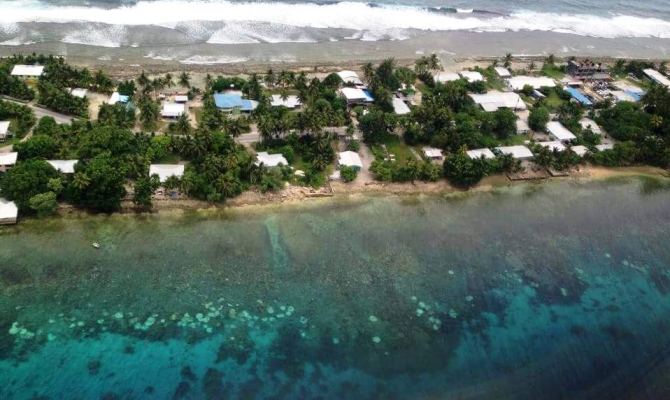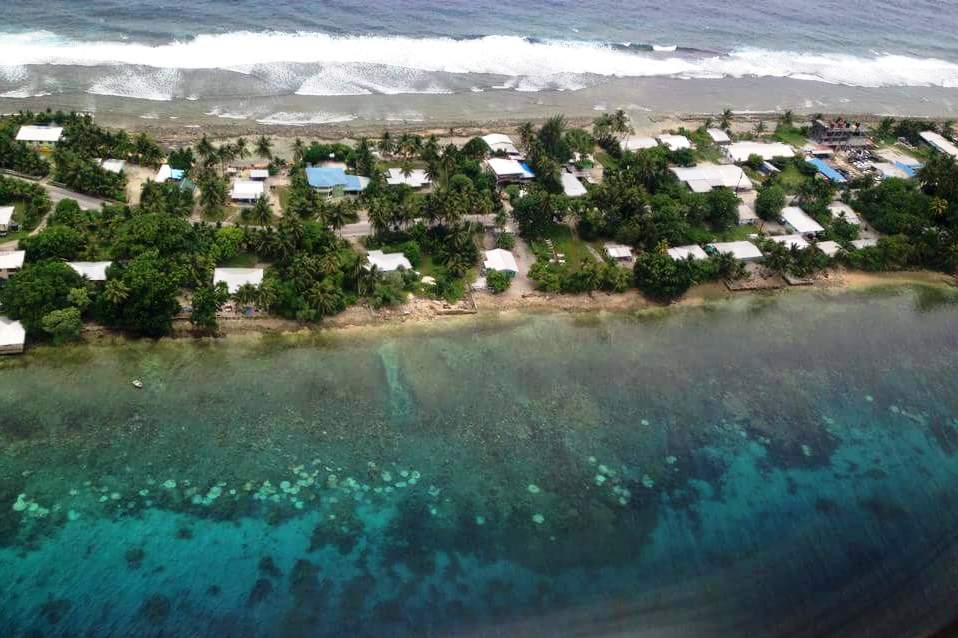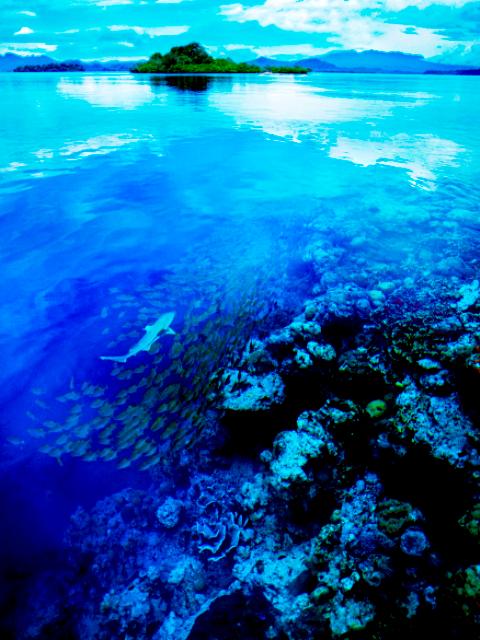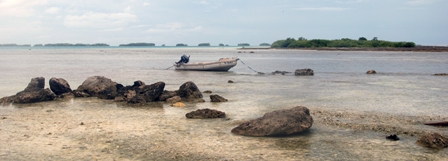
Climate Change Resilience
Ocean Acidification is rapidly emerging as a significant regional and global threat to our ocean ecosystems, fisheries, food security and livelihoods.
Increasing ocean acidification is driven by the emission of carbon dioxide into the atmosphere of which approximately 50% is absorbed into the atmosphere, 26% into the land and 24% into the oceans. This is changing the chemistry of the seawater, a process called Ocean Acidification.
"There is a lot of public discussion on climate change in the Marshall Islands, however not so much on ocean acidification. It's a new issue for us and we're keen to learn more on it and the impacts of this on us as a low lying atoll," said Ms. Kalena DeBrum, the Resource Management Facilitator of the Marshall Islands Marine Research Authority.
 The Marshall Islands, a low lying atoll. Photo - Diane McFadzien
The Marshall Islands, a low lying atoll. Photo - Diane McFadzien
"In my area of work I do a lot of coastal community visits - a lot of the feedback we receive from these coastal communities is they have noticed there is a shrinking number of shells and more degrading corals - it could possibly be because of ocean acidification, this is where research on this would go a long way."
While the long-term impacts of ocean acidification are yet to be fully understood, it is very likely to have significant impacts on a range of shelled animals such as corals, mollusks, crustaceans and habitats such as the coral reef.
It will also have direct and indirect impacts on coastal and pelagic ecosystems. In the Pacific Islands region coastal fisheries annually account for USD 200 million in subsistence value and another USD 165 million in commercial value, and the value of the region's industrial tuna fisheries is estimated at USD 6 billion.
Local factors, such as nutrient and organic loading into coastal waters, can add to the vulnerability of coastal systems to ocean acidification.
 Dr Elizabeth Jewett, Director of NOAA's Ocean Acidification Programme
Dr Elizabeth Jewett, Director of NOAA's Ocean Acidification Programme
"Further to that – the current rate of ocean acidification is 10-100 times faster than at any time in the past 50 million years, and the ocean has become significantly more acidic in the past 40 years. Ocean acidification could increase by a further 100-150% by 2100," presented Dr Elizabeth Jewett, the Director of the US National Oceanographic and Atmospheric Administration's (NOAA) Ocean Acidification programme.
"Ocean acidification will affect marine food webs, while it impacts on just one or a few species, it can have big effects on the food web and ecosystem services."
For Pacific island communities this impact could be huge.
The consumption rates of fresh fish among Pacific island coastal communities are among the highest in the world with people consuming up to 70 kilos of fish a year in at least 10 Pacific island countries and territories, with up to 150 kilos per year in some.
"Coastal fisheries provide between 50 to 90 percent of the protein intake for coastal communities and it's also extremely important for local incomes, providing around 50 percent of coastal households with the first or second source of income," presented Mr. Bradley Moore, a Coastal Fisheries Scientist of the Secretariat of the Pacific Community.
"One of the consequences of ocean acidification to Pacific coastal fisheries will be an overall reduction in fish numbers."
 SPREP Commemorates World Oceans Day - Healthy Oceans, Healthy Planet #WOD2015
SPREP Commemorates World Oceans Day - Healthy Oceans, Healthy Planet #WOD2015
An action based partnership to undertake a 1.8 million NZD project to strengthen the resilience of Pacific island countries and territories to Ocean Acidification has been signed between the Government of New Zealand and the Secretariat of the Pacific Regional Environment Programme (SPREP).
The Pacific Islands Partnership on Ocean Acidification is a regional initiative funded by New Zealand. The four-year project will be implemented by SPREP in partnership with the University of the South Pacific (USP) and the SPC.
"With the support from the Government of New Zealand, the Pacific islands will be taking their first steps in building resilience to ocean acidification through practical adaptation actions," said Dr Netatua Pelesikoti, the Director of the Climate Change Division of SPREP.
"Ocean acidification itself is not well understood and there are many gaps in research and information. The actions to address ocean acidification will be in partnership with other SIDS to enable for sharing of resources and expertise."
Research and Monitoring is one of the outputs of this partnership with a regional vulnerability ocean acidification assessment and research and ecosystem monitoring data to inform policy and adaptation. This information will be prepared to reach a wide range of audiences.
 Photo courtesy of Stuart Chape
The second output will see practical adaptation actions identified and carried out, including in pilot project areas yet to be selected and the third output is to ensure that Pacific island capacity is built to understand and adapt to ocean acidification as well as help raise awareness of this issue.
Photo courtesy of Stuart Chape
The second output will see practical adaptation actions identified and carried out, including in pilot project areas yet to be selected and the third output is to ensure that Pacific island capacity is built to understand and adapt to ocean acidification as well as help raise awareness of this issue.
"This project is timely for the Pacific islands, it follows on from work on providing projections on the acidity levels in our ocean as part of the Pacific climate change science program that ended in 2014," said Mr. David Hiba Hiriasia, the Director of the Solomon Islands Meteorological Service.
"The Solomon Islands Met Service is looking at establishing an Ocean Services Unit within our Met Service so that we can be in a better position to provide technical advice on this issue that will assist with planning. The reality is that ocean acidification is something we need to address as it is a growing problem, we can't wait any longer."
The starting point for forming the actions to achieve the project outputs is happening during a regional consultation and planning workshop this week attended by Pacific island countries, stakeholders and partners in Auckland, New Zealand.
"The important thing in the context of this project here is, what's going to happen now over the next 50 years so that we can be ready for what those changes might be," said Dr. Jewett who is currently participating in the regional workshop.
While this pioneering Pacific Islands Partnership on Ocean Acidification is just the start, it is hoped that this will be the catalyst for more projects to help Pacific island communities develop actions to address the challenges that ocean acidification poses for islanders across the region.
"It's a good opportunity for Tokelau to get on board, we'd really like to see a whole marine ecosystem baseline and go from there. We have very few stressors, such as impacts of overpopulation, sediment runoff and pollution, on our environment," said Ms. Jewel Tuitama, Project Officer in the Department of Economic Development, Natural Resources and Environment of the Office of Tokelau.

"While there can be a regional approach, we also need to tackle this issue at the country level – and although this project will develop two pilot project sites as a focus, we are also hoping this will spur further assistance and support as with more funding we can implement activities on ocean acidification in more Pacific islands, including Tokelau."
The first Pacific Islands Regional Ocean Acidification Workshop is one activity under the Pacific Islands Partnership on Ocean Acidification which came about due to the gaps and challenges identified at the
International Workshop on Ocean Acidification: State-of-the Science Considerations for Small Island Developing States hosted by the United States and New Zealand in partnership with SPREP during the Third United Nations Small Islands Developing States Conference on Sustainable Development in Apia, Samoa in 2014.
The three day regional planning workshop is held in Auckland, New Zealand from 7 – 9 October, 2015. Representatives from the countries of Cook Islands, Commonwealth of the Northern Marianas, Fiji, Kiribati, Marshall Islands, Palau, Papua New Guinea, Samoa, Solomon Islands, Tokelau, Tonga, Tuvalu and Vanuatu are attending.
Partners from Greenpeace, James Cook University, L'Institut de recherche pour le développement (IRD), NZ Ministry of Foreign Affairs and Trade, NZ National Institute of Water and Atmospheric Research, Secretariat of the Pacific Community, The Nature Conservancy, University of the South Pacific, University of Otago, US National Oceanographic and Atmospheric Administration (NOAA), and the University of Auckland are also participating in the workshop.
For more information please contact: Dr. Tommy Moore, PI-GOOS Officer, SPREP at tommym@sprep.org
Increasing ocean acidification is driven by the emission of carbon dioxide into the atmosphere of which approximately 50% is absorbed into the atmosphere, 26% into the land and 24% into the oceans. This is changing the chemistry of the seawater, a process called Ocean Acidification.
"There is a lot of public discussion on climate change in the Marshall Islands, however not so much on ocean acidification. It's a new issue for us and we're keen to learn more on it and the impacts of this on us as a low lying atoll," said Ms. Kalena DeBrum, the Resource Management Facilitator of the Marshall Islands Marine Research Authority.
 The Marshall Islands, a low lying atoll. Photo - Diane McFadzien
The Marshall Islands, a low lying atoll. Photo - Diane McFadzienWhile the long-term impacts of ocean acidification are yet to be fully understood, it is very likely to have significant impacts on a range of shelled animals such as corals, mollusks, crustaceans and habitats such as the coral reef.
It will also have direct and indirect impacts on coastal and pelagic ecosystems. In the Pacific Islands region coastal fisheries annually account for USD 200 million in subsistence value and another USD 165 million in commercial value, and the value of the region's industrial tuna fisheries is estimated at USD 6 billion.
Local factors, such as nutrient and organic loading into coastal waters, can add to the vulnerability of coastal systems to ocean acidification.
 Dr Elizabeth Jewett, Director of NOAA's Ocean Acidification Programme
Dr Elizabeth Jewett, Director of NOAA's Ocean Acidification Programme"Ocean acidification will affect marine food webs, while it impacts on just one or a few species, it can have big effects on the food web and ecosystem services."
For Pacific island communities this impact could be huge.
The consumption rates of fresh fish among Pacific island coastal communities are among the highest in the world with people consuming up to 70 kilos of fish a year in at least 10 Pacific island countries and territories, with up to 150 kilos per year in some.
"Coastal fisheries provide between 50 to 90 percent of the protein intake for coastal communities and it's also extremely important for local incomes, providing around 50 percent of coastal households with the first or second source of income," presented Mr. Bradley Moore, a Coastal Fisheries Scientist of the Secretariat of the Pacific Community.
"One of the consequences of ocean acidification to Pacific coastal fisheries will be an overall reduction in fish numbers."
 SPREP Commemorates World Oceans Day - Healthy Oceans, Healthy Planet #WOD2015
SPREP Commemorates World Oceans Day - Healthy Oceans, Healthy Planet #WOD2015The Pacific Islands Partnership on Ocean Acidification is a regional initiative funded by New Zealand. The four-year project will be implemented by SPREP in partnership with the University of the South Pacific (USP) and the SPC.
"With the support from the Government of New Zealand, the Pacific islands will be taking their first steps in building resilience to ocean acidification through practical adaptation actions," said Dr Netatua Pelesikoti, the Director of the Climate Change Division of SPREP.
"Ocean acidification itself is not well understood and there are many gaps in research and information. The actions to address ocean acidification will be in partnership with other SIDS to enable for sharing of resources and expertise."
Research and Monitoring is one of the outputs of this partnership with a regional vulnerability ocean acidification assessment and research and ecosystem monitoring data to inform policy and adaptation. This information will be prepared to reach a wide range of audiences.
 Photo courtesy of Stuart Chape
Photo courtesy of Stuart Chape"This project is timely for the Pacific islands, it follows on from work on providing projections on the acidity levels in our ocean as part of the Pacific climate change science program that ended in 2014," said Mr. David Hiba Hiriasia, the Director of the Solomon Islands Meteorological Service.
"The Solomon Islands Met Service is looking at establishing an Ocean Services Unit within our Met Service so that we can be in a better position to provide technical advice on this issue that will assist with planning. The reality is that ocean acidification is something we need to address as it is a growing problem, we can't wait any longer."
The starting point for forming the actions to achieve the project outputs is happening during a regional consultation and planning workshop this week attended by Pacific island countries, stakeholders and partners in Auckland, New Zealand.
"The important thing in the context of this project here is, what's going to happen now over the next 50 years so that we can be ready for what those changes might be," said Dr. Jewett who is currently participating in the regional workshop.
While this pioneering Pacific Islands Partnership on Ocean Acidification is just the start, it is hoped that this will be the catalyst for more projects to help Pacific island communities develop actions to address the challenges that ocean acidification poses for islanders across the region.
"It's a good opportunity for Tokelau to get on board, we'd really like to see a whole marine ecosystem baseline and go from there. We have very few stressors, such as impacts of overpopulation, sediment runoff and pollution, on our environment," said Ms. Jewel Tuitama, Project Officer in the Department of Economic Development, Natural Resources and Environment of the Office of Tokelau.

Fakaofo Lagoon in Tokelau. Photo courtesy of Tokelau Office Media Release
"While there can be a regional approach, we also need to tackle this issue at the country level – and although this project will develop two pilot project sites as a focus, we are also hoping this will spur further assistance and support as with more funding we can implement activities on ocean acidification in more Pacific islands, including Tokelau."
The first Pacific Islands Regional Ocean Acidification Workshop is one activity under the Pacific Islands Partnership on Ocean Acidification which came about due to the gaps and challenges identified at the
International Workshop on Ocean Acidification: State-of-the Science Considerations for Small Island Developing States hosted by the United States and New Zealand in partnership with SPREP during the Third United Nations Small Islands Developing States Conference on Sustainable Development in Apia, Samoa in 2014.
The three day regional planning workshop is held in Auckland, New Zealand from 7 – 9 October, 2015. Representatives from the countries of Cook Islands, Commonwealth of the Northern Marianas, Fiji, Kiribati, Marshall Islands, Palau, Papua New Guinea, Samoa, Solomon Islands, Tokelau, Tonga, Tuvalu and Vanuatu are attending.
Partners from Greenpeace, James Cook University, L'Institut de recherche pour le développement (IRD), NZ Ministry of Foreign Affairs and Trade, NZ National Institute of Water and Atmospheric Research, Secretariat of the Pacific Community, The Nature Conservancy, University of the South Pacific, University of Otago, US National Oceanographic and Atmospheric Administration (NOAA), and the University of Auckland are also participating in the workshop.
For more information please contact: Dr. Tommy Moore, PI-GOOS Officer, SPREP at tommym@sprep.org